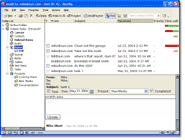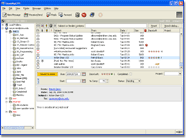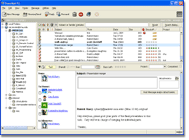Prototype Overview
Our work proposes to alter the existing social interactions in the workplace. So we felt that it was important that we observe the software in as realistic a setting as possible.
Paper prototypes could not realistically withstand the complexity of hard-to-predict real-world circumstances. And this inaccuracy would cost us insight into the complexities involved with multiple people working together.
In addition, Victoria Bellotti's work strongly advises that email prototypes need to be robust. These factors helped us choose to work with relatively high-fidelity software prototypes, since they would be better able to accurately gauge the actual consequences of our software in action.
We divided testing into three stages, each focusing on specific features while maintaining tight development deadlines.
 |
 |
 |
| Prototype 0 | Prototype 1 | Prototype 2 |
Phase 1: Concept Validation (P0)
The first phase, P0 (Prototype 0) served to test two different concepts. First we were looking to validate the idea of integrating tasks within email. Before we went any further we needed to know if this concept could effectively be understood by users and the value that it could potentially bring to knowledge workers. Secondly, we needed to determine the viability of a group workspace and the implications that it would have on people working together.
Phase 2: Task Interactions (P1)
Our second prototype, was built on an open source email client written in Java known as Columba. This version used a fully-functioning email client to test how people would interact with tasks within the context of email. It also tested the value of a personal reminder system within email. Lastly, it explored email as a semi-structured collaborative tool.
Phase 3: Integrated Collaborative Task Space (P2)
Building upon work done in P1, we looked to understand the benefits and issues involved in building a more fully-functioning shared workspace right into an email client. The prototype specifically tests what happens when users communicate information about their ownership status of tasks, and how informal document versioning works within that space.

